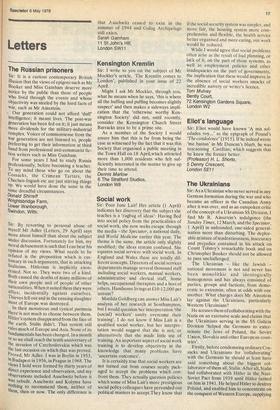Social work
Sir: Poor June Laid Her article (1 April) indicates her discovery that the subject she teaches is a `ragbag of ideas': Having fled into social policy from the practicalities of social work, she now seeks escape through the media — the Spectator, a national daily, and World Medicine earlier this year. The theme is the same, the article only slightly modified; the ideas remain confused. She equates social services with sOcial work. In England and Wales these are totally different concepts. Directors of social services departments manage several thousand staff including social workers, manual workers, administrative and clerical staff, home helps, occupational therapists and a host of others. Handsome livings at £10-12,000 per annum?
Matilda Goldberg can answer Miss Lait's analysis of her research at 'Southampton, but I would question her interpretation 'the (social) workers' sanity overcame their training'. I do not know. if Miss Lait is a qualified social worker, but her interpretation would suggest that she is not, or alternatively that she made little use of training. An important aspect of social work training is to develop objectivity in the knowledge that many problems have `uncertain outcomes'.
It is certainly true that social workers are not turned out from courses neatly pack-.
aged to accept the problems 'which con front them. They actually question policies which some of Miss Lait's more prestigious social policy colleagues have persuaded our political masters to accept.They know that if the social security system was simpler, and more fair, the housing system more comprehensive and flexible, the health service better organised and more caring, our work would be reduced.
While I would agree that social problems often arise as the result of bad planning, or laCk of it, on the part of those systems, as well as employment policies and other inadequacies on the part of governments, the implication that these would improve in the absence of social workers smacks of incredible naivety or writer's licence.
Tom Mulvey Bently Court, 72 Kensington Gardens Square, London W2






































 Previous page
Previous page